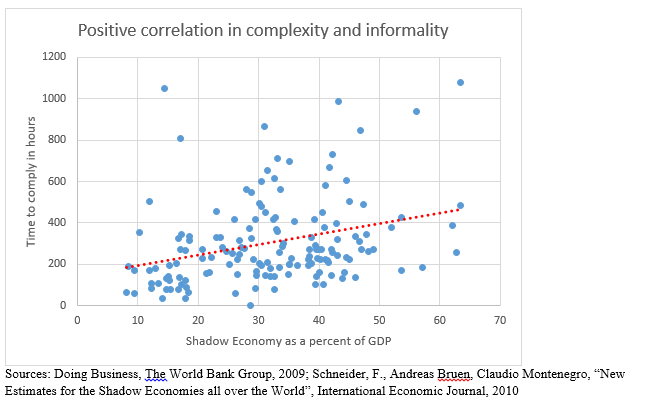
Tax administrations in developing countries are increasingly concerned about the persistent problem of loss of tax revenues to the shadow economy, and they often deploy a range of strategies to plug tax leaks and augment revenues. The erosion of the tax base prevents governments from collecting the revenue it needs to provide essential services, such as healthcare, road construction, and education. Nonetheless, it’s a sticky problem: how do you convince business owners to pay taxes?
Some possible answers, bolstered by evidence, include: simplify tax payment and provide incentives to formalize businesses. The World Bank’s Governance Global Practice will hold a conference between June 27-29 in St Petersburg, Russia, to bring together participants from almost 25 countries of the Europe and Central Asia region to discuss these issues under the aegis of the Tax Administrators eXchange of Global Innovative Practices, a peer-learning network of tax administrators. The event will be hosted by experts from the Public Sector Performance division of the practice.
One-third of the world economy is informal, as Friedrich Schneider, Andreas Buehn and Claudio Montenegro point out in their article, “New Estimates for the Shadow Economies all over the World.” Informality is most prevalent in Sub-Saharan Africa, with activities in the shadow economy amounting to 37.6 percent of the ‘official’ GDP, but is also significant in the Europe and Central Asia region (mostly transition countries) at 36.4 percent. In comparison, the shadow economy amounts to just 13.4 percent of GDP in high income OECD countries.
Schneider, Buehn, and Montenegro define the shadow economy as including all market-based legal production of goods and services that are deliberately concealed from public authorities to avoid payment of taxes or social security contributions or having to meet certain legal labor market standards. A simple regression of tax-GDP ratios on the shadow-GDP ratios shows a statistically significant negative relationship.


Experience of developed countries (see chart below, illustrating the European example) has shown that incentives – positive and negative - to carry out business transactions and make payments through formal banking channels, have a bearing on the level of informality. These incentives can be provided through tax policies and measures adopted by the tax administration.

The quality of governance matters as well. An analysis of data from the Worldwide Governance Indicators finds that there are two, Regulatory Quality and Control of Corruption, which have a measurable impact in diminishing the shadow economy and increasing the level of taxation. Further, of the competitiveness factors analyzed by the World Economic Forum’s Global Information Technology Report 2015, technological readiness is found to have a significant effect, reducing the shadow economy and increasing taxation.
This analysis suggests that reducing complexity of the tax system, and adopting tax measures – policy and administrative - to incentivize formal payments for business transactions through banking channels, including electronic payments, and use of “plastic money”, can prove useful in reducing informality. In addition, using ICT solutions to improve tax enforcement against shadow economy transactions, particularly measures to plug tax evasion directly related to transactions with the shadow economy, would be most effective.
We will discuss these and other issues related to making the informal economy formal on June 27-29 in St. Petersburg.
Tweet these:
Chasing shadows: Tax strategies to tackle the shadow economy.
One-third of the world economy is informal.
How to make the informal economy formal.
Loss of tax revenue hinders delivery of essential services such as healthcare and education.


Join the Conversation